Disposing medical waste is one of the biggest challenges healthcare providers face. It is further complicated by concerns about epidemiology, possible civil litigation, local and state regulation. By definition, medical waste is any waste with infectious material. By this definition, waste generated from physician offices, dental practices, hospitals, veterinary clinics, laboratories, and research facilities is included.
When looking for a disposal service or waste transport service in Utah, one has to consider how they go about the process. The waste typically contains things like bodily fluids or other contaminants that can spread or cause infection. It can be divided into the following categories:
General waste
This category covers the bulk of all medical waste from healthcare facilities. It is not considered hazardous. General waste will include things like office waste, plastic, and paper. It does not need any special procedures to dispose of. One can simply dispose of this waste through normal channels.
Infectious Waste
As suggested in the name, this waste category covers materials that present an infection risk. Note that infection, in this case, is not just limited to humans. If it can harm the environment or animals, it falls under this category. This waste will include bandages that are soaked with blood, human body parts, swabs, sharps, surgical waste, and cultures. Every state will have comprehensive rules that govern the management and disposal of this type of waste. There are even requirements for how it is to be transported, stored and disposed of. To process this waste, one needs licensing.
Hazardous waste
 This category covers waste material that is dangerous but will not be infectious to people. Therefore, some waste products that fall under the infectious waste will also be classified here, including unused sharp objects. This category also involves agents used in chemotherapy and other chemicals like the mercury used in thermometers.
This category covers waste material that is dangerous but will not be infectious to people. Therefore, some waste products that fall under the infectious waste will also be classified here, including unused sharp objects. This category also involves agents used in chemotherapy and other chemicals like the mercury used in thermometers.
Radioactive waste
If any substance contains any radioactive material, it will fall under this category. In healthcare facilities, these items include things used in radioactive therapy to run tests like thallium tests. Other therapies used in nuclear medicine especially in the treatment of cancers will fall under this category. By definition, nuclear medicine relies on radiation for diagnosis and treatment.
Regardless of the category, it falls under; most local requirements dictate that licensed haulers pick medical waste. The disposal of this waste is typically monitored closely so that practices follow regulation set by most states. The trash will need to be sorted out and then treated to make it harmless. From there, what is to be recycled undergoes recycling while the rest is thrown away. It is a good practice to work with a specific waste disposal company for two reasons.
First, after having checked their qualifications, you are at peace that they will not get you in trouble. Secondly, it helps in mitigating risk, maintaining compliance and keeping the community around your safe. Be sure to check that your professionals of choice have OSHA compliance training. A small slip can cost you a lot in litigation fees.


